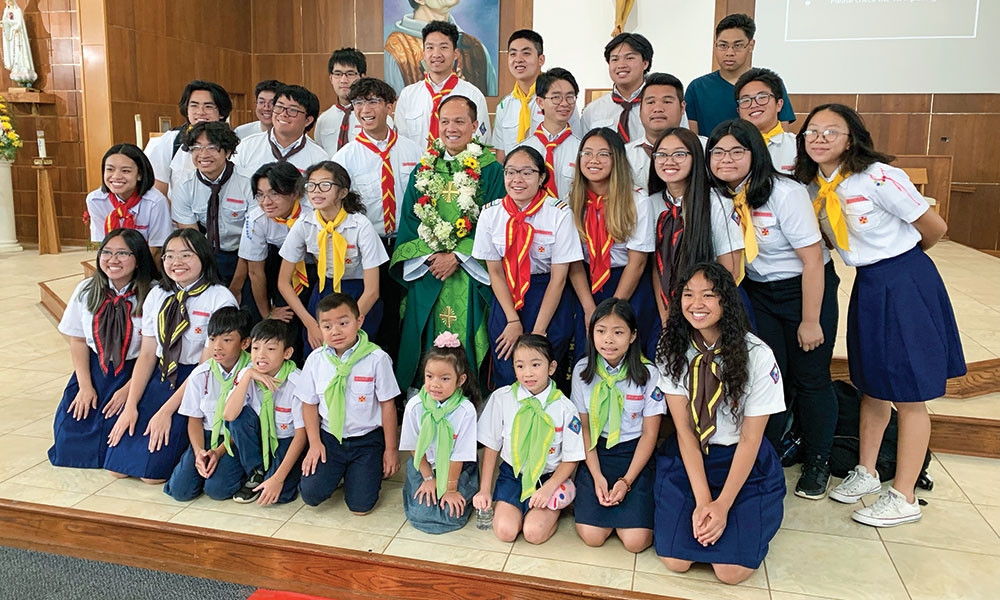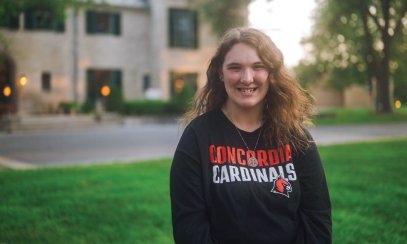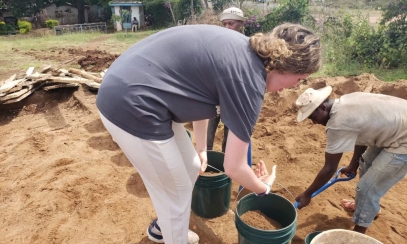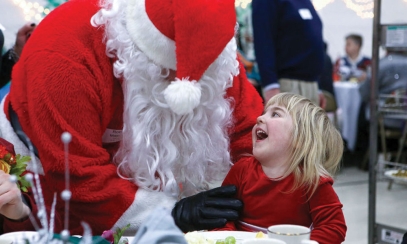
The Way We Love God: Diocese of Lansing’s Only Vietnamese Parish Celebrates its Silver Jubilee
Best known in Lansing for its Vietnamese festival each summer, when the church parking lot fills with musicians, dancers, and an army of volunteers taking orders for restaurant-quality pho, spring rolls and other classic dishes, St. Andrew Dung-Lac Parish is the spiritual and cultural home to the city’s Vietnamese Catholic community.
Best known in Lansing for its Vietnamese festival each summer, when the church parking lot fills with musicians, dancers, and an army of volunteers taking orders for restaurant-quality pho, spring rolls and other classic dishes, St. Andrew Dung-Lac Parish is the spiritual and cultural home to the city’s Vietnamese Catholic community.
The parish’s first wave of members primarily consisted of refugee families fleeing the aftermath of the Vietnam War, including the Communist government’s controlling grip over the Vietnamese Catholic Church. A generation later, as its 25th anniversary approaches Nov. 24, the St. Andrew Dung-Lac community has grown up — literally. With most older parishioners not fluent in English but the youngest, emerging generation immersed in American schools and culture, many of them speaking little Vietnamese, the parish seeks to thread the needle to bind tradition, culture and living faith in one community.
Its new pastor feels that balance keenly, even as he’s compelled to lead the parish forward into the future. Father Peter Doan (pictured on page 21) himself is of the generation of Vietnamese Americans who grew up in the in-between of drastically different cultures and eras. Born in March 1975, he was a newborn — his father a political prisoner — when his hometown of Saigon fell to North Vietnam one month later. He credits his devout grandfather, who took in his family during his father’s 13-year imprisonment, for planting the seeds of his vocation long before Father Peter immigrated to the U.S. as a teen.
Two days after Father Peter Doan arrived in Lansing this past August from his previous parish in Seattle, he met with Bishop Earl Boyea, who posed a question that Father Peter takes seriously as his mandate: How will you reach the youth of St. Andrew Dung-Lac?
“That’s the primary goal for me,” says Father Peter, who intentionally addresses the parish children in English during his homilies and enjoys opening the church gym for pickup basketball games. His mind is also on Vietnamese students at Michigan State University who might be searching for a familiar, spiritual home.
“I hope this is a place where they can rest their soul,” he says. He stresses that Vietnamese culture is not exclusively about the language and that St. Andrew Dung-Lac is open to anyone with a love of that culture, regardless of their fluency. If a non-Vietnamese speaker is hesitant about coming, “I’m bilingual,” he says, smiling.
This is not to say that Vietnamese culture goes unnoticed — visitors at the 11 a.m. Sunday Mass are immediately greeted by an enormous portrait of the parish’s patron saint behind the altar. In Vietnamese, Anrê Dũng Lạc (pronounced Ahn-rey Yoong Lack) was a 19th-century Vietnamese martyr. Chant flows back and forth between priest and congregation; distinct from the Gregorian chant more familiar to Western ears, it reflects the tonality of the Vietnamese language itself, with ancient roots that predate the arrival of Christian missionaries to the country. The readings, prayers and much of the homily — Father Peter’s youth-focused portion notwithstanding — are in Vietnamese.
Sr. Therese Vu, one of three Vietnamese Sisters of St. Paul of Chartres who serve at the parish, plays a large role in nurturing that culture. One of her first projects after arriving in 2014 was establishing a Vietnamese women’s organization chapter dedicated to St. Monica, one of the patron saints of mothers. On the feast of St. Monica last August, the women processed into Mass with their banner, matching in their traditional, floor-length tunics. Before Sunday Mass, Sister Therese oversees two hours of bilingual religious education and Vietnamese language lessons for children — another effort to ensure the youngest generation, who might not read Vietnamese but can pray fluently in their grandparents’ native language, remains included in the rich tapestry of faith.
“We must learn how to do both,” says Sister Therese. “This is our culture.”
Food is another anchor for promoting culture. Every other Sunday, the parish basement transforms into a pop-up restaurant, feeding families and visitors alike, including those who drive into Lansing from over an hour away to spend the day among the community. And the day isn’t over yet: Sunday lunch is followed by a meeting of the Vietnamese Eucharistic Youth Movement (VEYM), the local chapter of a thriving international organization whose uniform-clad children and leaders inspire Father Peter’s hope of a faith-filled parish for coming generations.
Anson Than, 21, is one of those youth group leaders. The son of immigrant parents, he’s emblematic of St. Andrew Dung-Lac’s changing demographics — born and raised in Lansing, he didn’t learn much Vietnamese as a child, but the parish is home, and he wants to give back as a way of living out his faith.
“I want to be all in,” says Anson, a student at Lansing Community College and one of about 10 young adult leaders in St. Andrew Dung Lac’s VEYM chapter.
Anson joined VEYM as a high schooler, where he found mentorship and a sense of belonging — a place where everyone not only looked like him and understood his experiences as a Vietnamese-American teen, but also sought to grow in their faith together. Now, Anson strives to emulate his former mentors and live as an authentic Catholic witness to his younger brothers and sisters in Christ. He also hopes to introduce them to the other forms of Catholic prayer and devotion he was exposed to at Lansing Catholic High School – “praying from the heart,” or incorporating praise and worship in some meetings.
“I’m trying to show (them) there are different ways to worship God,” Anson says. He heard Father Peter plans a homily series about the meaning of the Mass and is excited about that. Anson says that gathering as Vietnamese Catholics is a gift, but “the Eucharistic aspect is the main draw for me.”
Straddling the balance again is Father Peter, making sure the Vietnamese Mass is accessible to younger parishioners, while also holding on to what makes the liturgy beautifully distinct from any other Catholic community they might find in the region.
He says those details make St. Andrew Dung Lac feel like home to him and the Vietnamese Catholic community.
“This is the way I love God.”



